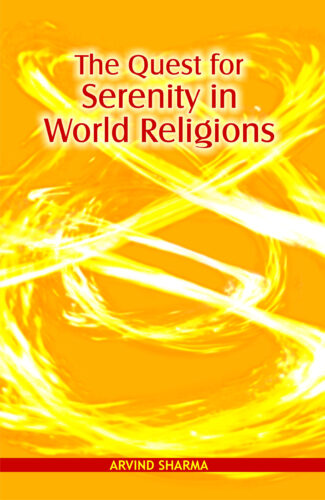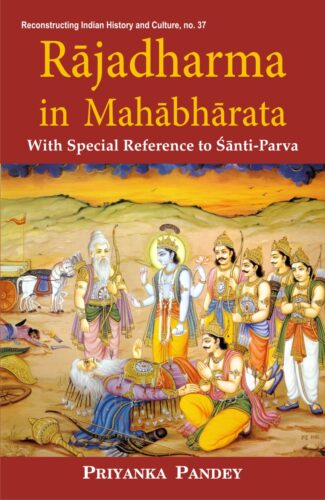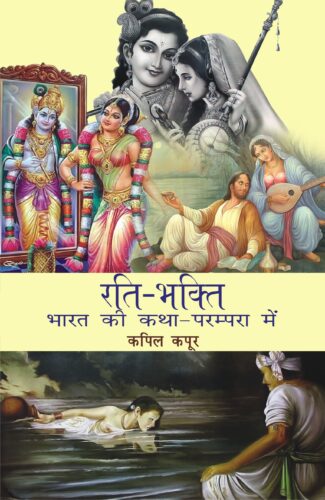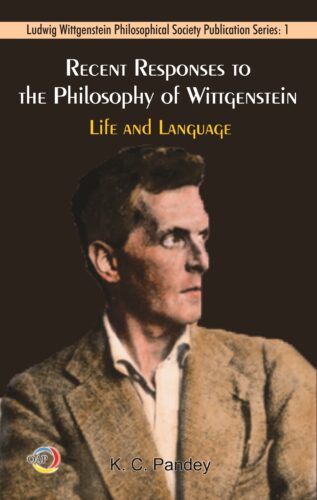Showing 151–160 of 258 results

Examining the relation between religion and ecological concern in Hinduism, the book covers aspects like the ecological implications of pilgrimage, worship of earth and river goddesses, and Vedanta and Tantra theologies. It discusses how traditional ideas affect contemporary Indian thought.
Examining the relation between religion and ecological concern in Hinduism from textual, theological, anthropological, feminist, and eco-activist approaches, this volume brings together an international, interdisciplinary group of scholars. The book covers the most relevant aspects of the Hindu tradition, searching out the ecological implications of pilgrimage and sacred geography, earth and river goddesses, the beliefs and ritual practice of villagers, caste consciousness and Vedanta, Tantra, and Goddess theologies. The book considers, in a thoughtful and analytical way, a timely issue: how important and basic traditional ideas like asceticism, karma and rebirth, and purity and impurity influence contemporary Indian thinking about the environment. It has an impressive and diverse array of contributors, and there is a nice balance of theory and fieldwork. It shows well how India is sacred ground (and water).
The founding fathers of the quantum revolution were deeply invested in questions of meaning. Distanced from theology but also from the deterministic objective Materialism of the classical model of physics, several of them, including Bohr, Heisenberg, Pauli, Schrödinger and Bohm looked to Eastern philosophies for explanations. This search for meaning beyond church and clockwork seems to have stagnated in our times. Yet, recent advances in physics and the reinterpretation of historic experiments have given us new ways to understand and ask fundamental philosophical questions. These approaches include further considerations of the Copenhagen Interpretation of Bohr, Heisenberg and others, the Transactional Interpretation of John G. Cramer and Ruth Krastner, Quantum Bayesianism (QBism) of Fuchs, Schack and David Mermin; questions related to the meaning of observation and measurement; the Orthodox view of quantum mechanics; collapse of the wave function and time and quantum field theory. The present volume brings together a number of these approaches discussed by leading contemporary physicists. It also expands the consideration of the quantum revolution to include its larger implications for philosophy, mathematics, biology and global understanding, reopening the questions of consciousness and meaning which occupied the minds of the early thinkers of Quantum Mechanics.

This book describes the search for serenity as found in what are conventionally referred to as the world religions and identifies a similarity in the pattern which seems to underlie these approaches, thereby extending the application of the comparative method to religious psychology.
Every religion, even ideology, needs to provide its followers with ways of coping with the vicissitudes of life, especially when personal tragedy tears a gaping hole in the fabric of meaning. This book describes the search for serenity as found in what are conventionally referred to as the world religions and identifies a similarity in the pattern which seems to underlie these approaches, thereby extending the application of the comparative method to religious psychology.

Goutam Ghosal tells lucidly the magic pairing story of two of the ever renowned poets of India Tagore and Sri Aurobindo. Both these poets are in love with the oppressed earth wishing it to change one day into a beautiful planet. They are not satisfied with God, sitting high above in the blue, and wish to bring Him down on this polluted and plundered globe.
The link between Tagore and Sri Aurobindo has been too insufficiently explored. There is no book as yet in English, which has attempted to integrate the two makers of the modern Indian tradition. One searches in vain for a critical comparative study of the two writers in any other Indian language. The book traces back the formative influences of the two mighty Bengalees growing up almost together without any interaction between them till the first decade of twentieth century. While Tagore took a direct initiative in meeting the yogi in Pondicherry, Sri Aurobindo wrote about his contribution silently listing him as one of the pioneers of the future poetry along with Whitman, Carpenter and others. Basically, both poets are in love with this oppressed earth, wishing it to change one day into a beautiful planet. The Divine is certainly an engaging passion for both of them. But they are not quite satisfied with God who stays far away from us hidden in the high far blue. They wish to catch Him in the net of their poetry and love and bring Him down here on this polluted and plundered globe. Dreamers of a new creation on earth, they wish to form a rainbow bridge marrying the soil to the sky. Goutam Ghosal tells the story of that magic pairing lucidly, keeping the balance throughout. He seeks for an integral view of the two masters, which comes out through his observations on their poetry and fiction, drama and criticism, letters and casual notes. A new approach to Tagore’s music and painting is an added charm of the book.

This book deals with all aspects of politics based on Mahabharata and addresses topics such as dandaniti, origin of state, the seven elements of state, functions of state, types of state, kinship, judiciary and administration in detail, among many other issues of political importance.
The idea of politics hardly finds an expression elsewhere as clearly as in Mahabharata. This work thus investigates the political thought explicit in Shanti-Parva and emphasizes that Mahabharata is a text in the study of politics, apart from the perception of it being a great epic and a text of high literary value. Whatever be the notion of politics we contemplate upon, it finds an articulation in Mahabharata. As the Greek tradition of thinking is the base of Western politics, Shanti-Parva of Mahabharata represents the Indian notion of political thinking, though there remain many similarities and dissimilarities between the two systems.
This volume navigates one to how to read Mahabharata as a political text; the idea of political thoughts, the constituting principles of politics and the political institutions in Shanti-Parva; and the relevance of these political thoughts in modern time. Topics such as dandaniti, origin of state, the seven elements of state, functions of state, types of state, kinship, judiciary and administration are discussed in detail, among many other issues of political importance.
The book collects, analyses and examines the internal evidences from Shanti-Parva and also from other parvans of Mahabharata to reach a decisive conclusion, making the work a composite result of textual analysis, related literature and subjective contemplation. It clearly shows that the idea of politics is not separated from the idea of ethics. Rather they are intertwined.

?????: ??????????????? ?? ?? ??????, ???? ??? ????? ?? ????? ?? ???? ??, ???? ??? ?? ?????? ????? ?? ???? ?? ???? ???? ?? ????? ???? ?? ?? ????? ???????? ?? ?????-???? ??, ??????? ????? ??????? ?????? ?? ???? ???? ???? ??, ??????? ?????? ??????? ??? ??? ?? – ?????? ??????? ?? ????? ?????? ???? ?????-??????? ??? ??? ???? ??????? ?? ????????? ?? ?? ?? ??? ??? ????? ???? ????? ?? ????? ??? ?? – ???????-????????
??????????????? ?? ?? ??????, ???? ??? ????? ?? ????? ?? ???? ??, ???? ??? ?? ?????? ????? ?? ???? ?? ???? ???? ?? ????? ??????? ???????? ?? ??? ??, ??? ???????? ?? ???? ?? ?????????? ???? ???? ???? ???????? ?? ???????, ???????, ?????????? ?? ????????????? ?? ????? ???? ?? ?? ????? ???????? ?? ?????-???? ??, ??????? ????? ??????? ?????? ?? ???? ???? ???? ??, ??????? ?????? ??????? ??? ??? ?? µ ?????? ??????? ???????? ?? ??????? ??? ????? ???? ??? ?????? ???????? ???? ??? ??? ?????? ???? ???? ??? ???? ???? ???? ??? ?? ????? ?????? ???? ?????-??????? ??? ??? ???? ??????? ?? ????????? ?? ?? ?? ??? ??? ????? ???? ??????? ?? ???????? ?? ?????? ?? ???? ??????? ?? ??? ??? ?????? ???? ??????? ??? ????? ?? ????????? ?? ???? ??? ??? µ ??? ?? ??? ??? ???, ??? ?? ?????? ??? ? ??? ?????

The concept of love-devotion is visible since ancient times in Indian history. In the poems and narrations of love-devotion human love has been depicted in the form of divine love. The love is permanent sentiment of Shringara rasa. Shringara rasa is of utmost importance in the tradition of textual contemplation.
There is intense interrelationship of love and devotion in narrative tradition of India. The concept of Rati-bhakti (love-devotion) is visible in Indian history since ancient times. Love and devotion are two facets of the one and the same fact. In the poetry and prose of Rati-bhakti, the human love is regarded as divine. Here, God and devotee are seen as lovers and, on the other hand, lovers are considered as the form of God himself.
The knowledge of Shastras, not being accessible to all, is propagated through narration. There are unlimited treasures of narratives in all languages and scholarly traditions of India as well as various themes related to manhood-quartet of narration-treasure. In this book, the main focus is on Rati-bhakti (devotion to love). In the cogitation of poetry-text, shringara rasa is foremost and the fundamental one for thinkers like Bhojaraj. The permanent rasa of shringara is love and how this is accomplished in shringara and devotion, is beautifully depicted in this book.
In the folk tales of Punjab, the narrators/poets of Rati-shastra/narrations see love-adorable in divine form and in devotional narrations and poetry, the poets and narrators see their God as their lover or beloved. This love-devotion tradition originated in India in the seventh century ce through the Tamil Alvars in their prabandhas. This tradition remained alive till nineteenth century in the folk tales of Punjab. Since then, owing to Western influence, the love is seen as lust in place of devotion.
In this book the contemplation has been done on tradition, intellectual tradition, the knowledge of narration and means of narratives, the relationship between knowledge and narratives.
This book sould prove to be thought-provoking and interesting for students and scholars of philosophy, language and literature as well as for the common readers.

Prof. Puligandla reveals the central Upanisadic insights and the significance of the observations to modern scientific thought. He comes up with ideas on the nature of the ultimate reality, compatibility of science, religion and philosophy, etc.
Since ancient times, philosophers and scholars have attempted to study and analyse the profound thoughts of the Upanishads in order to unravel their true meaning. The lectures presented here are a fresh analysis of the Upanishadic thinking with respect to reality, knowledge and consciousness. Prof. Puligandla here attempts to reveal the central Upanishadic insights and the significance of the observations to modern scientific thought. He comes up with some important ideas on the nature of the ultimate reality, compatibility of science, religion and philosophy, and the Upanishadic teaching vis-a-vis modern science. He also successfully dispels crucial misunderstandings of Shankaras philosophy and that of Nagarjuna. The speciality of the book is the authors novel interpretation of mysticism as an effective instrument of Brahma jnana or knowledge of Reality. In a bold and intellectually stimulating presentation, Prof. Puligandla shows that the mysticism of the Indian tradition, far from being illogical or irrational, is meant to awaken and inspire the seekers mind for the quest of the ultimate reality. Such knowledge even transcends all forms of catogorial knowledge. This work is an extremely absorbing scholarly masterpiece characterized by a unique understanding of Upanishadic thought. Its lively yet analytical discussion of the Upanishads would present a new perspective to serious scholars of philosophy.

The book gives a fresh interpretation from the perspectives of recent issues raised on life and language in the philosophy of Wittgenstein. The essays contained in this anthology explore philosophical issues that have been raised during recent debates and discussions in Wittgensteinian epistemology, theology, logic, ethics, religion, social science, cultural studies, psychology and language.
The essays contained in this anthology explore philosophical issues which have often been raised during recent debates and discussions in Wittgensteinian epistemology, theology, logic, ethics, religion, social science, cultural studies, psychology and language. It is based on the idea that Wittgenstein’s thoughts have not only been interpreted by the academicians in philosophy, but have been used as a method in many other fields of Humanities and Social Sciences as well. Keeping in view this idea, the book gives a fresh interpretation from the perspectives of recent issues raised on life and language in the philosophy of Wittgenstein. It discusses Wittgensteinian issues through the perspectives of the Indian as well as the contemporary world.

This book, a translation of Sage Narada’s Narada Bhakti Sutra, is didactic and religious in spirit, and is an intellectual attempt to elucidate two approaches to bhakti, one for the intellectually inclined and the other for the emotionally inclined. It has many more facets that relate to personal experience of that Supreme Love by which bhakti is defined.
The Narada Bhakti Sutra is didactic and religious in spirit, but this new translation and interpretation by Dr Alka Tyagi is an attempt to elucidate bhakti in all its facets without the need for the religious paraphernalia. The focus of this text is to reveal bhakti as a methodical approach that can lead to an experience of Supreme Love by which it is defined.
There are two streams of thought that go hand in hand in the text. The first line of thought indicates bhakti (the Supreme Love) as a progressive path towards a goal. The second line of thought conveys bhakti as a path which is simultaneously the goal as well. For those who are clearly emotionally inclined, it is easy to choose the second line of thought where bhakti is the goal itself.
Those who are intellectually inclined might find it difficult in the beginning to exercise unconditional love. For them, the first line of thought will work better. They can consciously choose bhakti (the path of love) as a step by step progressive path towards fulfilment and joy in life. For them, the rules of truth, non-violence, non-duality along with the rituals of ekadasadha-bhakti (the elevenfold bhakti) as prescribed by Sage Narada could be helpful techniques.
Bhakti, whether it is adopted as a process or is taken up as a goal, is a means to direct the emotional energy in every human being in a positive direction in order to experience and attain fullness in life.